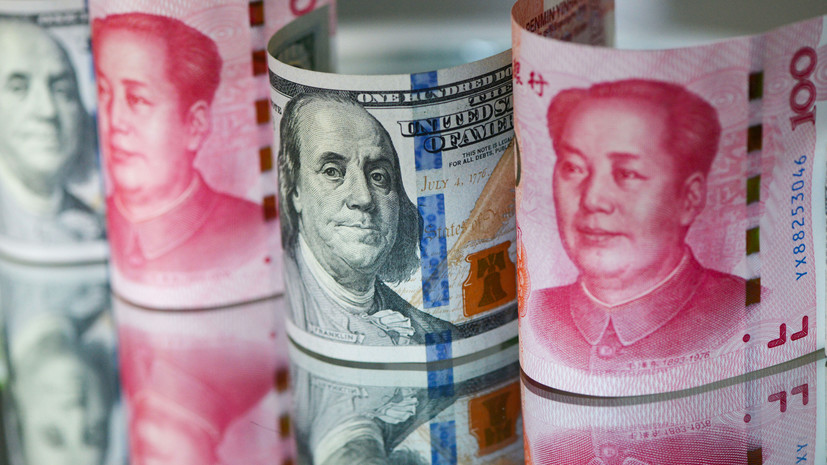China has reduced investment in US government bonds (treasuries) to a record low in the past 12 years, according to data from the US Treasury Department.
According to the report of the department, in September 2022, the volume of Chinese investments in the public debt of the United States decreased by $38.2 billion to $933.6 billion. The indicator fell to its lowest level since June 2010.
US Treasury Treasuries are debt obligations guaranteed by the US government.
States buy securities and receive a stable income from them.
In other words, government bondholders are lending their money to the economy of the United States.
Today, in addition to China, the main US creditors are Japan (the country holds $1.12 trillion in treasuries), Great Britain ($663 billion), Belgium ($325 billion), Cayman Islands ($301.4 billion), Luxembourg ($298.6 billion), Switzerland ($278 billion) and Ireland ($265 billion).
“Investing in treasuries has previously been a profitable way to invest in the gold and foreign exchange reserves of countries that accumulate most governments in case of any political or economic shocks,” Eduard Kharin, head of the directorate for working with shares of Alfa Capital Management Company, told RT.
However, the change in the course of the monetary policy of the US Federal Reserve System (FRS) has led to the fact that the treasuries previously bought by investors began to bring them a lower income.
Georgy Svirin, a specialist in international financial markets at the Finmir marketplace, expressed this opinion in a conversation with RT.
In November, the US Federal Reserve increased the interest rate by 75 basis points at once, to 3.75-4% per annum - to the highest level since January 2008.
“By mid-2023, the rate may rise to 5%.
With the growth of this value, the yield of new government bonds also increases.
As a result, it becomes more interesting for asset holders to sell earlier issues and purchase new bonds with higher rates for part of the funds received,” Svirin explained.
At the same time, China is now more interested in returning funds to its balance sheet than in investing in Western markets, the analyst added.
In particular, Beijing will be able to direct free money to new technologies, industry, national projects, which should improve the country's economic performance, the analyst is sure.
In October, the International Monetary Fund (IMF) revised down its forecast for China's GDP growth in 2022 and 2023 to 3.2% and 4.4%, respectively.
According to the fund's experts, such dynamics was the result of increased coronavirus restrictions in the republic.
Priority change
Note that the Asian republic began to gradually reduce investment in US Treasury bonds back in 2019.
Then, against the backdrop of a trade confrontation, Washington and Beijing exchanged sanctions blows, trying to reduce each other's share in the global economy.
“Previously, the Donald Trump administration has repeatedly threatened the Chinese government that, as a sanction, it could freeze their assets invested in US securities.
Beijing's current actions show that the Chinese authorities are fully aware of the possibility of tense relations with the United States and are preparing for such a turn of events, reducing dependence on American public debt, ”Fyodor Sidorov, founder of the School of Practical Investment, said in an interview with RT.
An additional signal for the sale of US government securities by China was the anti-Russian sanctions of the West, experts are sure.
Recall that since the end of February 2022, the United States, together with the European Union and a number of other countries, continue to introduce new restrictions against Moscow.
According to the global database for tracking sanctions Castellum.AI, more than 12.8 thousand restrictions have already been introduced against the Russian Federation (about 10.2 thousand of them since February 22).
Restrictions, in particular, affected the banking industry, the energy sector, aviation and trade.
In addition, the West froze almost half of the country's gold and foreign exchange reserves (GFR) - $ 300 billion.
“Such a precedent served as an occasion for China to think about the security of its reserves, so it is possible that the reduction in geopolitical tensions will be of a long-term nature.
Amid fears of a freeze, China may start investing in real assets, such as raw materials, and strengthen cooperation with other foreign partners,” Eduard Kharin emphasized.
According to Chinese government statistics, in eight months of 2022, China's financial investments in Russia reached $450 million. Compared to the same period last year, the figure increased by 150%.
At the same time, the parties plan to further develop cooperation through the implementation of new joint investment initiatives, the Ministry of Economic Development of the Russian Federation said.
“The inclusion of these projects will increase the existing portfolio by $1.3 billion,” added Vladimir Ilyichev, deputy head of the department.
Gettyimages.ru
© VCG / VCG
Beijing is rapidly increasing cooperation with Moscow in the energy, agro-industrial, textile, and high-tech sectors, experts say.
Thus, since the beginning of this year, the trade turnover between the two countries has increased by a third and for the first time in history has approached $154 billion, according to data from the General Administration of Customs of the People's Republic of China.
According to the department, from January to October, the export of Chinese products to Russia increased by 12.8%, to $59.6 billion. Moscow, meanwhile, increased the supply of goods to Beijing by 49.9%, to $94.34 billion. In the future, trade interaction between the two countries will only continue to strengthen, analysts do not exclude.
“In particular, we are talking about the development of bilateral trade with the Russian Federation and investments in Russian industry.
In general, China is trying to increase its influence by deepening economic cooperation, so it will also actively invest in African, Latin American and other Asian countries,” said Georgy Svirin.

